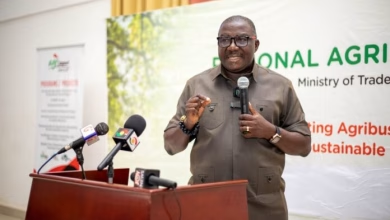Dr Amin Adam Wants Stakeholders To Capitalize On AI Opportunities For Economic Resilience

- Finance Minister Dr. Mohammed Amin Adam has urged stakeholders to capitalize on the transformative potential of AI
- He emphasized the critical role of AI in accelerating productivity and reimagining economic growth in Africa
- He stressed the urgency for seizing AI opportunities to achieve long-term economic sustainability and resilience
Finance Minister Dr. Mohammed Amin Adam has urged stakeholders to capitalize on the transformative potential of AI to propel African innovation to new heights. His remarks came during the inauguration of the Accra AI Summit themed ‘AI as a Catalyst to Transform Economies in Sub-Saharan Africa’.
“I only ask that Governments, the private sector, development partners, and academia continue to prioritize working together to ensure we unlock an independent, wealthy future for Africa where technology removes the obstacles that preclude our people, and indeed our Nations from realizing their potential,” said Dr. Amin Adam.
He emphasized the critical role of AI in accelerating productivity and reimagining economic growth in Africa. “Viewed within that lens, AI technologies present a unique opportunity for Africa to accelerate productivity and reimagine its economic growth, which is, more than ever, vital for the welfare of the world,” he added.
Citing the World Bank’s projection that AI could potentially increase global GDP by up to 14% by 2030, Dr. Adam highlighted Sub-Saharan Africa’s significant prospects in this regard
“We are a rapidly growing population of 1.4 billion people, with 70% under the age of 30. Already we missed out on the first, second, and third industrial revolutions. Quite frankly, there is no time to wait,” remarked Dr. Adam at the Summit.
He stressed the urgency for seizing AI opportunities to achieve long-term economic sustainability and resilience. “Given the exigencies of the moment, we cannot afford to miss out on the opportunities that AI present to make a significant leap toward achieving long-term economic sustainability and resilience,” stated Dr. Adam.
“In Ghana, we want to leverage AI to harness the ingenuity and talents of our people so we can build a self-sufficient, safe, and prosperous society capable of delivering jobs and a dignified future for our people,” he added.
Highlighting Ghana’s initiatives in leveraging AI, Dr. Adam mentioned pragmatic innovations such as the GhanaCard, mobile money interoperability (MMI), National Digital Addressing System, and the Ghana.gov platform for payment of government services.
Furthermore, the Ministry of Finance is exploring AI applications in Public Financial Management through automated budgeting, predictive revenue forecasting, and real-time expenditure tracking.
The Managing Director of the International Monetary Fund (IMF), Ms. Kristalina Georgieva, echoed the transformative potential of AI in Sub-Saharan Africa during a panel discussion at the AI Summit.
“Nearly 800 million people are hungry. So we do have inequality before AI, and the question is would AI reduce or increase inequality?” emphasized Ms. Georgieva.
She outlined three fundamental investments essential for ensuring that AI contributes to reducing inequality, emphasizing the pivotal role of Artificial Intelligence.
“The first one is in human capital, investing in people,” asserted Ms. Georgieva, stressing the indispensability of education, technology access, and digital rights.
She advocated for rethinking social safety nets as the second critical investment, empowering individuals to help themselves by ensuring access to technology and the internet.
Lastly, Ms. Georgieva underscored the significance of ethics and strong democratic institutions in fostering inclusive decision-making processes.
“By far our best chance is in investing in the green transition and in the adoption of artificial intelligence,” Ms. Georgieva stated, emphasizing the importance of prioritizing investments in AI and green transition initiatives.
Addressing the readiness of nations to embrace AI, Ms. Georgieva identified digital infrastructure, investment in human capital, innovation, and regulatory frameworks as key factors. She cited Singapore and Denmark as exemplary models of preparedness.
During the panel discussion, Minister for Communications and Digitalization, Mrs. Ursula Owusu-Ekuful, provided insights into Ghana’s efforts to prepare for the AI revolution through investments in digital infrastructure. She affirmed Ghana’s commitment to leveraging AI to drive economic growth and development.






